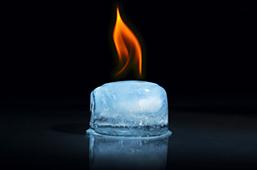
Dr. Jerilynn C. Prior, researcher at the VCH Research Institute, shines a cool light on the hot, and often bothersome, topic of hot flushes.
Q: I’ve heard pretty creative descriptions of that hot flush feeling – e.g. it’s like standing in an active volcano. What’s really going on with my body?
A: When we have a hot flush or night sweat (hot flushes during sleep), there is a massive release of dozens of brain chemicals and neurotransmitters. What is true is that our comfortable core temperature has become so narrowed we either sweat or shiver. Hot flushes occur because of “estrogen addiction”. Our brains have got used to high estrogen levels and react like an addict’s when estrogen levels decrease.
Q: What is the difference between a hot flush and hot flash?
A: No difference except the USA uses “flash” where Canada uses “flush”.
Q: What are some of the biggest myths about hot flushes?
A: Hot flushes are misunderstood in three main ways:
- Myth: They only occur in menopausal women (more than a year since their last flow). Actually, they start in women with regular menstruation and erratically high estrogen levels!
- Myth: They are caused by “estrogen deficiency.” Although they do occur in menopausal women whose estrogen levels are normally low, what counts are episodes of rapidly dropping estrogen (or “estrogen withdrawal”) that the brain “sees.” “Estrogen withdrawal” is the problem.
- Myth: Estrogen is the only effective treatment for severe hot flushes. Yes, estrogen or estrogen/progestin work for menopausal hot flushes, however, ovarian hormonal therapy carries risks including worsening flushes when we try to stop. Most important, physiologically identical progesterone – estrogen’s partner hormone – taken orally is a very effective hot flush treatment in menopausal women based on a trial CeMCOR recently completed; it doesn’t cause blood clots, migraines or high blood pressure and appears safe for the heart. Progesterone therapy also causes no rebound hot flush increase when you stop taking it.
Q: Does this only affect women or do men experience hot flushes too?
A: Men, especially those who are having male-hormone lowering treatment for prostate cancer, can also get very severe hot flushes because their testosterone is naturally converted into estrogen so the brain reacts when their testosterone/estrogen levels drop.
Q: I’m in my late 30s; when might I start experiencing hot flushes and what other perimenopausal changes should I be aware of?
A: Perimenopause can normally start as young as 35 but doesn’t usually begin until the late 40s. Cyclic night sweats are one of the tell-tale signs of perimenopause. Other early indicators are shorter cycles, more cramps, heavier flow, new or increased migraine headaches and trouble sleeping. Only about one in five women will have sufficient perimenopause difficulty to see their family doctor about it.
Q: How can I help myself or other women in my life turn the internal heat down and ‘stay cool’ during a hot flush?
A: Decreasing our own responses to stress is the most important hot flush strategy. Not that we can quit our jobs, send our kids/parents/partners packing or suddenly win the lottery. It means taking charge by becoming informed about perimenopause and specifically tracking our experiences (see the Daily Perimenopause Diary). Talking with other women also helps. Most important is to consider perimenopause a normal phase of life — it doesn’t for a second mean “getting old”!
Other helpful strategies are regular exercise (a ½ hour walk helps), eating a healthy, high vegetable/fruit diet, learning and practicing relaxation/meditation/yoga breathing and, if needed, stopping cigarettes. The good news is that perimenopause ends! I certainly find the challenges of menopause much easier to deal with.
If you’re still menstruating and are waking more than twice a week with night sweats or have four hot flushes a day — help us find an effective hot flush treatment for you and others like you! Join a four-month Canadian government-funded study of progesterone for perimenopausal hot flushes. Whether you receive the progesterone or the placebo, you are likely to see a reduction in your hot flushes and night sweats while making a major contribution to women’s health. You may participate in person or from home anywhere in Canada. Contact Research Coordinator, Andrea Cameron, 604 875-5960 (toll free 855 875-5960) or email andrea.cameron@ubc.ca.



